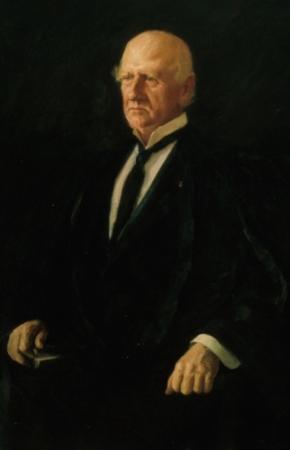You are here
Circuit Court Opinions:
Associate Justice John Marshall Harlan, United States v. Southern Pacific Railroad Co. (1892)

United States v. Southern Pacific Railroad Co., 49 F. 297 (C.C.N.D. Cal. 1892) [Ninth Circuit]
Justice Harlan was not allotted to the Ninth Circuit, which included California, but heard Southern Pacific Railroad under a special commission from Justice Stephen Field, the circuit’s regular justice. Harlan’s opinion in the case focused on the important issue of personal jurisdiction (i.e., whether a court can exercise jurisdiction over the defendant’s person) over corporations in federal court. The Jurisdiction and Removal Act of 1875 provided that a civil suit could be brought in—or removed from state court to—a district where the defendant was an “inhabitant” or was “found at the time of serving such process.” An act of 1887 amended the 1875 statute, removing the latter clause so that a suit could be heard only in a district of which the defendant was an inhabitant (except in diversity jurisdiction cases, which could be brought in the district of residence of either the plaintiff or defendant).
The Southern Pacific Railroad was a California corporation which operated railroad lines within the state and had its principal executive offices in San Francisco. It alleged, however, that it had transferred all its property to the Southern Pacific Company, which was chartered in Kentucky. As Justice Harlan noted, the Southern Pacific Company owned no property and did no business in Kentucky. It had an agent stationed there for the sole purpose of maintaining its Kentucky charter. The question before Harlan, therefore, was whether a corporation chartered elsewhere but doing business and having agents in California could be considered an “inhabitant” of that state.
Harlan acknowledged prior case law holding that corporations were citizens of the states in which they were created, and that acquiring property and doing business in other states did not change that status. Those cases did not establish, he pointed out, that a corporation “may not, in addition to its primary, legal habitation or home in the state of its creation, acquire a habitation in, or become an inhabitant of, another state, for purposes of business, and of jurisdiction in personam.” Harlan decided that it was “eminently just” that the Southern Pacific Company be considered an inhabitant of California. By operating railroad lines within the state, it had a “fixed residence” there, and behaved exactly as it would have had it been chartered in California. He therefore denied the defendant’s motion to dismiss for lack of jurisdiction.
In 1945, the Supreme Court issued a landmark ruling regarding the circumstances under which an out-of-state defendant could be sued in federal court without being deprived of due process. In International Shoe Co. v. Washington, the Court held that personal jurisdiction could be exercised over a defendant having “minimum contacts” with the forum state “such that the maintenance of the suit does not offend ‘traditional notions of fair play and substantial justice.’”
